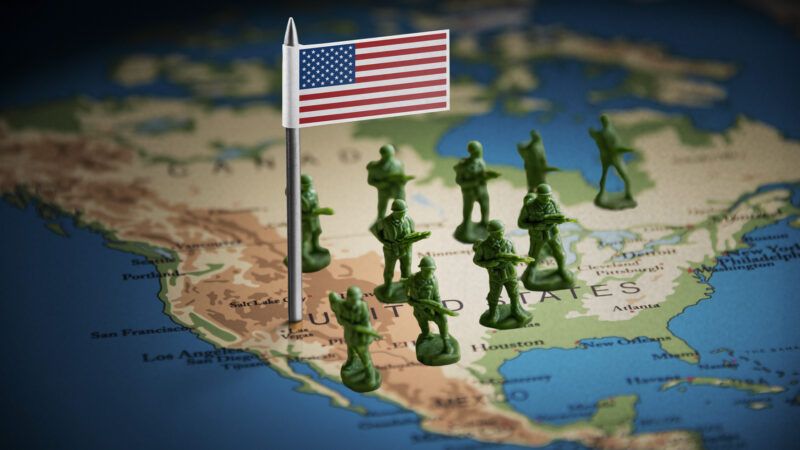Pentagon Draws Up Plans To Send Troops to American Cities
The Trump administration is considering plans for a "Reaction Force" of National Guard troops to deploy quickly to American cities with signs of civil unrest.

The Trump administration, which on Monday deployed the D.C. National Guard to address crime in the nation's capital, is reportedly gearing up to deploy more troops in American cities.
Pentagon plans leaked to The Washington Post detail plans by the Trump administration, time-stamped in late July and early August, for a "Domestic Civil Disturbance Quick Reaction Force" of 600-troop National Guard units. These National Guard units, two 300-troop groups stationed at bases in Alabama and Arizona, would be ready to deploy within an hour to U.S. cities "facing protests or other unrest."
The quick-reaction teams would be on task for 90 days "to limit burnout," according to the Post. The plan involves rotating Army and Air Force National Guard units from several states, including Maryland, New Mexico, Nebraska, and Tennessee.
Cost projections indicate that the mission could amount to "hundreds of millions of dollars." However, the earliest this program could be funded through the Pentagon's budget is FY 2027. The Post's report also mentions that it is currently uncertain whether the proposal has been presented to Defense Secretary Pete Hegseth.
The National Guard Bureau referred Reason to the Defense Department for comment.
In response to Reason, a Defense Department official stated, "The Department of Defense is a planning organization and routinely reviews how the department would respond to a variety of contingencies across the globe. We will not discuss these plans through leaked documents, pre-decisional or otherwise."
Titles 10 and 32 of the U.S. Code give the president the authority to mobilize National Guard troops for federal missions. Title 10 allows forces to support law enforcement without performing arrests or investigations. Under Title 32, the state or territory governor retains control of the National Guard; however, their duties are federally funded and regulated, which provides guardsmen more latitude in law enforcement missions.
The proposal leaked to the Post would allow the president to mobilize the National Guard under Title 32 in states experiencing civil unrest, but acknowledges "the potential for political friction should that state's governor refuse to work with the Pentagon."
Laura Dickinson, law professor at George Washington University Law School, tells Reason there's a "strong legal argument that they couldn't in this status be sent to a state without the consent of that state's governor." In response to the president's actions in Washington, D.C., Maryland Democratic Gov. Wes Moore has already said that he would "not authorize" National Guard forces in Maryland.
"This proposal fits into a larger pattern that we're seeing in which the administration is seeking to use the National Guard and the military to perform direct law enforcement functions or to act in support of law enforcement when there doesn't seem to be a real emergency or crisis," Dickinson adds.
The new Pentagon plan mirrors an effort by the first Trump administration to utilize the National Guard to quell political protests. Before the 2020 election, the administration had 600 Guard troops prepared in Arizona and Alabama in anticipation of political violence.
"This is Donald Trump's attempt to create his own de facto Praetorian Guard," Patrick Eddington, senior fellow at the Cato Institute, tells Reason.
"It's worth reflecting that such actions by the British Crown are what started the American Revolution," he adds. "These acts by the Trump regime have nothing to do with crime and everything to do with armed, coercive political intimidation and repression."
The state of California is currently suing the Trump administration for deploying 700 Marines and 4,000 of the state's National Guard to the city of Los Angeles amid protests over immigration raids taking place in the city in June.
The Trump administration has openly and unconventionally deployed federal law enforcement and the military to achieve its objectives. While it's unclear if or when this will happen, the Pentagon's plan, if implemented, would be yet another encroachment on federalism from the Trump administration.


Show Comments (87)